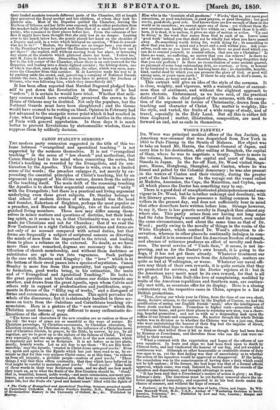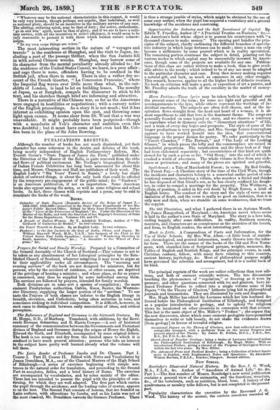WOOD'S FANKWEL*
Dn. WOOD was principal medical officer of the San Jacinto, an ,American war-steamer that was despatched from New York in 1855 to Palo Pinang in the Straits of Malacca. Her object was
to take on board Mr. Harris, the. Consul-General of Japan, and carry him to his destination, after calling at Bangkok, the capital of Siam, where he was to negotiate a treaty. There is more in the volume, however, than the capital and court of Siam and Simoda in Japan. In the far-off East, Dr. Wood visited tnge- pore, Macao, Hongkong, Shanghai, and Canton, where he was hissed and pelted by the Celestial democracy ; he was also present in the waters of Canton and their vicinity,, during the greater part of the last Chinese war. In the voyage out the vessel called at Madeira, Ascension, the Cape, the Mauritius, and Ceylon, upon all which places the Doctor has something racy to say.
There is a good deal of unsophisticated plainspokenness and some vigour in Dr. Wood, but he is rather unkempt and desultory, with few literary graces. He also possesses a failing common to tra- vellrs in the present day, and does not sufficiently bear in mind that other describers have written before him. Strange however, to say it, there is less generic novelty in Bangkok than almost any where else. This partly arises from our having not long since had Sir John Bowring's account of Siam and its court, seen under the same circumstances, and about the same time as that of Dr. Wood ; partly owing to the novelty of things in the realm of the White Elephant, which confined Dr. Wood's attention to ob- servation, whereas in other places he continually indulges in com- ment. ind it is in comment that his American freedom of remark, and absence of reticence produces an effect of novelty and fresh- ness. The naval service of " Uncle Sam," it seems, is not im- proving, and as for the Doctor's own branch, it is going to the dogs, if it has not got there already. Whatever treatment our medical department may receive from the Admiralty, matters are quite as bad at Washington, or worse. Whatever our naval offi- cers may think of their own rewards, it is quite certain that they are promoted for services, and the Doctor rejoices at it : but in the American navy merit must be its own reward, for that is all it will get. This John Bull-like love of complaining, modified by traits of the American republican and Southern man, are continu- ally met with, as occasions offer for its display. Here is a closing commentary on the respective cases in China, apropos to a list of British promotions.
" Thus,during our whole year in China, from the time of our own short, sharp, decisive actions, to the capture by the English of Canton, we had the gratification of seeing our English friends made,' after the intelligence of these deeds reached home. Promotion to higher rank—promotion which carried some home, and gave their places to rejoicing new men, was a cheer- ing, hopeful promotion ; and not as with us a desponding look upon the coffins of our friends and companions. No matter though the whole British nation was in division as to whether the Chinese war was a just one those who were maintaining the honour of their flag had the impulse of 'direct, personal, individual hope to cheer them on. "Chinese shot killed those it hit as dead as though they had been fired by Russian or Frenchman, and therefore those who ran the risk were en- titled to their reward.
" What a contrast with the expectation and hopes of the officers of our own squadron. In boats and ships we had been fired upon to death by Chinese forts, and had vindicated the honour of our flag, and yet avoided a continuous war. Although no other honourable or creditable course of duty was open to us, yet the first feeling was that of uncertainty as to whether the action of the squadron would be approved or disapproved. If the latter, the consolation was in the consciousness of having done a duty which could not be left undone ; if the former, the best hope was that of a formal official approval, which came, was read, listened to, buried amid the records of the squadron and department, and brought advantage to none.
" It has been said that a Frenchman's motive of action is glory ; an Eng- lishman's duty. The American must be yet further removed above the in- ferior impulses of humanity, and expected to do his best deeds under the chance of censure, and without the hope of reward.
• Fanhcei ; or the San Jacinto in the Seas of India, China, and Japan. By Wil- liam Maxwell Wood, M.D., U.S.N., Author of " Wandering Sketches in South America, Polynesia," &c, Published by Low and Son, London ; Harper and Brothers, New Tork. " Whatever may be the national characteristics in this respect., it would be only very human, though perhaps not angelic, that individual, as well as national glory, should be an incentive in the military service of any race. The abiding, enduring spirit, may be that of duty ; the active, enthusiastic, go in and win' spirit., must be that of glory, and if we are to have a mili- tau service, with all the incentives to active efficiency, it would seem to be only reasonable to present it with those which human nature acknow- ledges, In my own corps things are worse." The most interesting section in the nature of "voyages and travels" is the residence at Shanghai, and the visit to Japan, in- cluding a part of the passage thither, when the San Jacinto fell in with several Chinese wrecks. Shanghai, may borrow some of its character from the mental peculiarity already alluded to ; for the residence of the United States Consul, we learn, is a poor affair ; and cage there is none, offenders having to be confined in the
i
British jail; when there is room. There is also a rather dry ac- count of the French Quarter, " La Concession Francaise," where the Imperial flag waves over little more than what, in the out- Skirts of London, is land to let on building leases. The novelty at Japan, as at Bangkok, compels the discourser to stick to his text, and his sketches though brief are informing and attractive.
There is a narrative of thei Chinese war, so far as the Americans were engaged in hostilities or negotiations; with a cursory notice of the English proceedings. Aa a story it is not much ; but it has interest as exhibiting opinion upon the spot, and throwing some light upon causes, It seems clear from Dr. Wood that a war was unavoidable. It might probably have been postponed—though with a mandarin of Yeh's character and ambition even this was doubtful ; but it must have come at last even had Mr. Cob- den been in the place of Sir John Bowring.



























 Previous page
Previous page